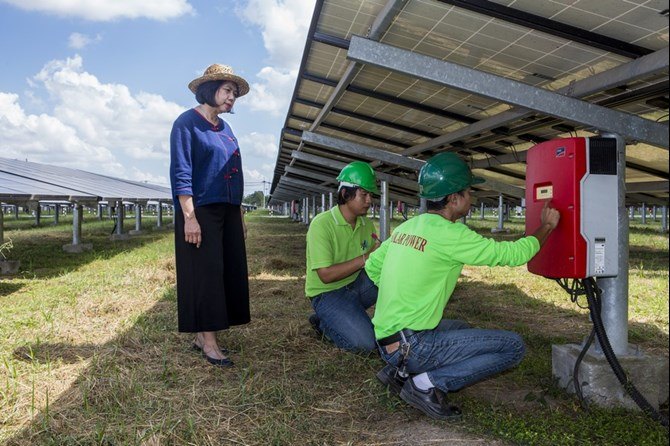Earlier this week,
our public relations office sent out a press release and posted information on the college
Facebook page about our participation here at COP20 in Lima. Based on prior experience, if this was the
local paper, I would (sadly) expect the trolls to make snide remarks. You know -- how sending students to our
college is a waste of money, something about climate denial, and the liberal
“crap” we teach in higher education. (It's true.) I
wasn’t, however, expecting negative comments from our own alumni.
ID-10-T error. I'm so ashamed that my Alma mater is sending
people to this farcical conference.
I should know better
than to respond to Facebook comments like this, but nevertheless, I replied:
I would like to hear
more about why you feel this way. The process is by no means perfect, but do
you have a better solution as to how we address the major global issue?
The response:
The people at these
conferences are all "watermelons." They pretend to care about the
environment, but they're really just communists looking to redistribute the
world's wealth. If the United States agrees to meet certain targets, we risk
ruining our own economy. Remember, the people at the conference can't commit
the US to do anything. Only the Senate can ratify international treaties.
Nothing will be accomplished at this conference.
Well, if this
individual had heard the fiery speech from Evo Morales, President of Bolivia, at
the Opening Plenary of the High Level Segment, he would be further convinced of
his claim. Personally, I interpreted the
comments from Morales as a call to rethink our unsustainable economic
systems and consumptive lifestyles, and to allow others the opportunity for a fair, safe, and healthy standard
of living. I suppose that would mean a redistribution of wealth. Because this speech was
from Bolivia, – the first country to include Rights of Nature in its national
constitution – there was also a call to protect Mother Earth.
 |
| Evo Morales at the Opening Plenary of the High Level Segment, COP20 |
It was another
tactical error, this time on my part, to continue the conversation with a
lengthy response:
I am well aware of
the inability of the US to ratify agreements here and with the political
environment in Congress, chances are slim that anything environmental will get
ratified back home. Sadly, much talk here is to find a way to come up with an
international agreement that bypasses the U.S. -- a country that is still one
of the largest greenhouse gas emitters, especially if you express this per
capita.
Are there some here who are interested in
redistribution of wealth? Perhaps, but they typically don't express it so
blatantly. Rather, there are discussions of "Polluter pays" - e.g.
for the alleged damage that has been caused by greenhouse gas emissions leading
to climate change. There are calls for help
with the development and transfer of new clean renewable technologies so that developing
nations don't make the same mistakes that the US, EU, China, etc. have.
I will disagree, however, that an
agreement/compromise/treaty will ruin our economy. There will be some
adjustments in the short term, but as a scientist who has carefully studied the
data, if we don't rethink our fossil fuel use and adapt, the longer-term
impacts will be much, much worse for the economy.
But I would also add
that there is no better way to hear all of the perspectives and be educated
about the complexities of the issues than to be here with students and to bring
these perspectives back to the broader community at home in an unbiased a way
as possible.
End of that
conversation.
The second alum to comment played off the first:
I agree a liberal
arts college and professors that think liberal and teach liberalism - if only
they would research and get their facts correct.
Hmmm. Being curious, I had to inquire what
facts/research were incorrect, but received no response to that question.
Since I was on a
roll, I continued:
I also suggest that
you look up the original meaning of the term "liberal education" and
then ask you how participating in international deliberations about a globally
recognized challenge is not something we should be doing as educators and
researchers?
To that, he replied:
Goggle the true
facts and stop agreeing with another liberal Huffington Post - Your telling us
if Goggle the true facts and stop agreeing with another liberal Huffington Post
- Your telling us if we stopped exhaling carbon dioxide the planet would be
better off?
There is no response for a statement like that. But for the
record, as a scientist and academic, I prefer peer-reviewed scientific
literature over things that someone might find on Google. And I won't repeat some of the other comments he made.
Thank goodness for
the response of a third alumnus – albeit one that the first two would likely feel had
been brainwashed. You see, this person attended COP15 with the Moravian delegation in Copenhagen in
2009.
I'm ashamed to share
the same alma mater with someone who thinks that it is laughable that world
leaders are discussing something as serious as anthropogenic climate change
(which nearly all scientists studying the data agree exists)... Moreover
believes it is a conspiracy theory brought about by world leaders to
redistribute the world’s wealth (That is laughable. If that was the case,
policy would have been implemented long ago, but it isn't and hasn't due to the
many interest groups involved). Discussion must come before policy.
The impact of
attending a COP meeting on that student, and the others who have attended, has been
profound. I distinctly remember this particular student sitting on the floor in a circle with youth representatives from small
island nations, learning about their fears of having to move their entire
country, leaving behind their homes, their culture, their history, their
sense of place. And I remember the passionate description in a post-COP essay about how that experience had changed his perspective on his own life.
I was thinking of
that student today as I listed to opening remarks by Enele Sopoaga, Prime
Minister of Tuvalu. This is a small
island nation midway between Australia and Hawaii. It is only 4.6 meters above sea level at
highest point, and thus, it is one of most vulnerable nations to climate change
impacts, especially sea level rise.
 |
| Enele Sopoaga, Prime Minister of Tuvalu |
The prime minister first told of the tragic and historic
connection between his country and Peru as there are Tuvaluans buried in this
land, those brought over to work in the mines.
But he went on to note that no other leader has had to face question of
whether their nation will survive or disappear under the sea. He added, Think of what it is like to be in
my shoes? He then asked the audience
if they were faced with this situation, what would they do?
The passionate part of speech that came next was not expected. My notes captured his words close to verbatim
and I include them here because they are worth sharing.
After a reference to Dante (“The darkest places in hell are
reserved for those who maintain their neutrality in times of moral crisis”),
Sopoaga said that this is a time of crisis and asked if [the other leaders] want this [the
consequences of climate change] on their conscience. The prime minister was in New York during the
Climate March in September, and said that he was moved when he saw signs for the support of Tuvalu
in midst of people – all 400,000 of them.
“I heard their moans, their calls, and share their concerns. It is time to ignore the voices of the
climate change deniers driven by big fossil fuel industries, to ignore the
national leaders who don’t believe.
These are shallow creatures who only see face of dollars. In Tuvalu, we see faces of children, and it
is these children to whom they must answer.
...The fossil fuels we use today are from extinct animals and
plants, they signify extinction, we must
not condemn ourselves to extinction.
… Ask everyone who leaves this room to look into eyes of
first child they see and imagine what those eyes will see in 10 or 20 years. Will they see hell or a sustainable planet? Let us try to build a firm foundation here so
that we can stand proud in Paris. ‘Yes
we have a future for you’ is what we can tell our children. Let us make 2015 the year we save the world,
save Tuvalu. Because if we save Tuvalu,
we will save the world.
These are the speeches we hear at the COP meetings. These are the tough questions we wrangle
with. If this is “liberal crap,” then so
be it.






